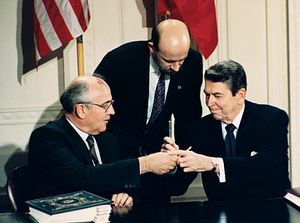In early February 2019, U.S. President Donald Trump confirmed his intention to withdraw the United States from the 1987 Intermediate-Range Nuclear Forces Treaty, ostensibly because of ongoing Russian violation of the treaty’s limits. Some U.S. officials have pointed to China – which is not a party to the INF Treaty – and Beijing’s growing military capabilities as a motivating factor for the U.S. to walk away from its restrictions on the development of ground-launched cruise and ballistic missiles with range capabilities between 500 and 5,500 kilometers. Director of the Asia Program at the Woodrow Wilson International Center for Scholars Abraham M. Denmark, in the following interview, lays out what U.S. withdrawal actually means in practice and provides insight on what the implications for the security landscape in Asia.
What does the U.S. withdrawal from the 1987 Intermediate-Range Nuclear Forces Treaty mean in practical terms?
Once the U.S. has withdrawn from the INF Treaty, it will be free to develop and deploy ground-launched ballistic and cruise missiles with ranges of between 500 and 5,500 kilometers. It’s important to note that this treaty is only an agreement between the U.S. and Russia – China has not been a party to the treaty, and the region’s military dynamics have evolved without it.
We should also keep in mind that the INF Treaty does not ban missiles of that range that are launched from planes, ships, or submarines; nor does it ban ground-launched missiles with inter-continental ranges. The U.S. has already deployed significant numbers of missiles not covered by the INF Treaty – withdrawal simply gives the U.S. more options to produce and deploy different kinds of missiles.






























